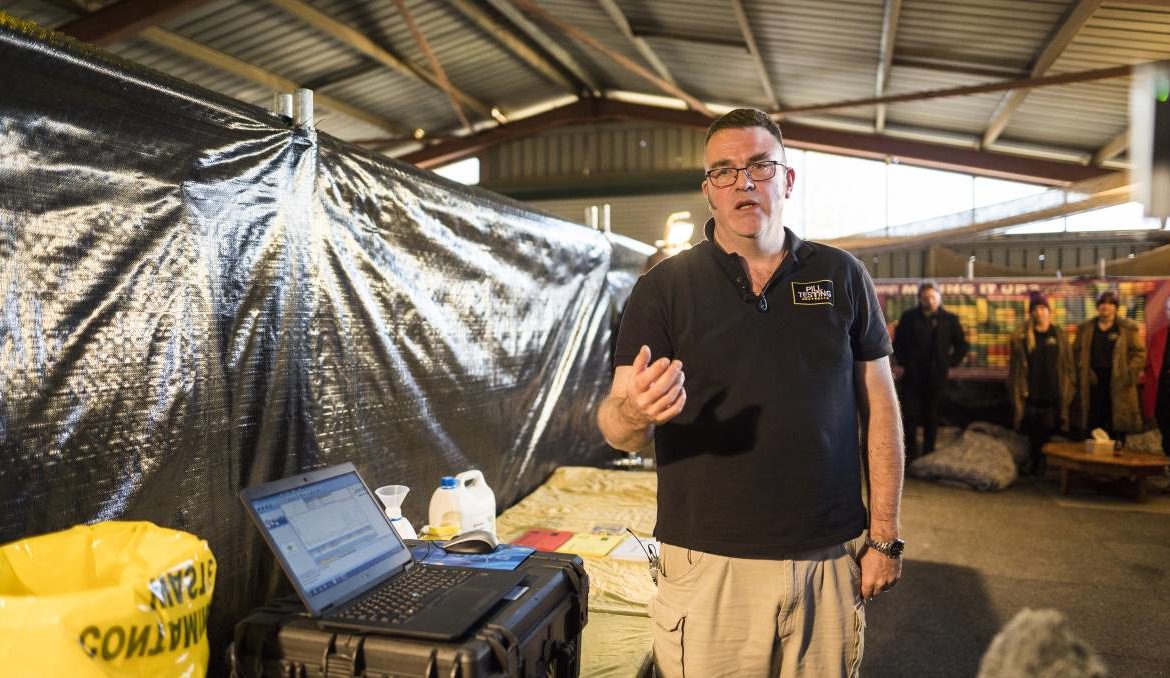news, act-politics, pill testing, canberra, david caldicott, groovin the moo, civic, drugs, ecstasy, pills
Health authorities could give an Australian-first static pill testing trial in Canberra’s CBD the green light as early as next month, with the government waiting on legal and public safety advice before making a final decision. It comes as the ACT government releases a new policy that encourages event organisers to consider providing pill testing at their events. The territory is the only jurisdiction in Australia to have trialled pill-testing, with hundreds of drugs analysed at two Groovin the Moo festivals. The current proposal being considered by the government would make pill testing a regular occurrence in Civic over the summer. Emergency medicine physician David Caldicott, who is a member of Pill Testing Australia, says the organisation has provided a model for the static site to the ACT government. He said the service would reach a new segment of the community that may not have benefited from festival testing. “COVID or no COVID, music festivals or no music festivals, there are still a lot of people in the community who are choosing to use drugs, and we are still, as medical practitioners, obliged to make sure they remain safe,” Dr Caldicott said. “The overwhelming majority of drugs that are consumed in Australia are consumed outside the music festival environment. “There is a lot of data that people are still using drugs – the problem of course is they are less able to access support networks.” He said a static site could expand the reach of the program to less affluent socioeconomic groups than those who attend music festivals. It would also be an opportunity to assess different drugs, such as heroin, which could be laced with substances like fentanyl. Dr Caldicott said the model presented to the government by Pill Testing Australia was based on one used in the Netherlands. Several locations in the ACT are under consideration for the fixed site, which would be open at specific times during the week. “People could drop in, chat, and, if they want, have something analysed,” he said. “And they would be provided with the information that is required for them to stay safe. It’s not a complex process really, the complexity comes in when you’re dealing with the politics of introducing something into a country that is unfamiliar with it.” Dr Caldicott said it could work in conjunction with a safe injecting room, if there were the political appetite for it. An ACT government spokeswoman said the government was currently considering legal and practical advice about establishing the pilot program. READ MORE: “This includes considering the need for a legal or regulatory framework, policing matters, public safety, access to a site and quality assurance of pill testing,” she said. A final decision about whether the pilot will go ahead is expected by early December. “The ACT government remains committed to investing in evidence-based and practice-informed harm minimisation responses to the use of drugs,” she said. The government has recently released a report that provide guidelines for festivals or events wanting to provide pill testing services. It encourages, but does not mandate, festival organisers to consider providing pill testing at their events. “It is expected that events such as large-scale music festivals and dance parties would be the most likely events to have pill testing, however other events are not excluded,” the framework says. “If pill testing is deemed appropriate, the event organiser should then follow best-practice procedures as outlined in this policy. ” The policy says event organisers who want to conduct pill testing must talk to ACT Policing and the ambulance service at least three months before the event. Organisers who want to conduct pill testing must employ a qualified organisation to run medically supervised services, such as Pill Testing Australia. “The pill testing organisation is required to advise, organise and operate the pill testing service at the event. The cost of these services is to be negotiated between the service operation and the event organisers with the cost to be borne by the event organisers,” the policy says.
/images/transform/v1/crop/frm/fdcx/doc753plkbbezk18y8cc6yi.jpg/r3_307_5998_3694_w1200_h678_fmax.jpg
Health authorities could give an Australian-first static pill testing trial in Canberra’s CBD the green light as early as next month, with the government waiting on legal and public safety advice before making a final decision.
It comes as the ACT government releases a new policy that encourages event organisers to consider providing pill testing at their events.
The territory is the only jurisdiction in Australia to have trialled pill-testing, with hundreds of drugs analysed at two Groovin the Moo festivals.
The current proposal being considered by the government would make pill testing a regular occurrence in Civic over the summer.
Emergency medicine physician David Caldicott, who is a member of Pill Testing Australia, says the organisation has provided a model for the static site to the ACT government.
He said the service would reach a new segment of the community that may not have benefited from festival testing.
“COVID or no COVID, music festivals or no music festivals, there are still a lot of people in the community who are choosing to use drugs, and we are still, as medical practitioners, obliged to make sure they remain safe,” Dr Caldicott said.
“The overwhelming majority of drugs that are consumed in Australia are consumed outside the music festival environment.
“There is a lot of data that people are still using drugs – the problem of course is they are less able to access support networks.”
He said a static site could expand the reach of the program to less affluent socioeconomic groups than those who attend music festivals.
It would also be an opportunity to assess different drugs, such as heroin, which could be laced with substances like fentanyl.
Dr Caldicott said the model presented to the government by Pill Testing Australia was based on one used in the Netherlands.
Several locations in the ACT are under consideration for the fixed site, which would be open at specific times during the week.
“People could drop in, chat, and, if they want, have something analysed,” he said.
“And they would be provided with the information that is required for them to stay safe. It’s not a complex process really, the complexity comes in when you’re dealing with the politics of introducing something into a country that is unfamiliar with it.”
Dr Caldicott said it could work in conjunction with a safe injecting room, if there were the political appetite for it.
An ACT government spokeswoman said the government was currently considering legal and practical advice about establishing the pilot program.
“This includes considering the need for a legal or regulatory framework, policing matters, public safety, access to a site and quality assurance of pill testing,” she said.
A final decision about whether the pilot will go ahead is expected by early December.
“The ACT government remains committed to investing in evidence-based and practice-informed harm minimisation responses to the use of drugs,” she said.
The government has recently released a report that provide guidelines for festivals or events wanting to provide pill testing services.
It encourages, but does not mandate, festival organisers to consider providing pill testing at their events. “It is expected that events such as large-scale music festivals and dance parties would be the most likely events to have pill testing, however other events are not excluded,” the framework says.
“If pill testing is deemed appropriate, the event organiser should then follow best-practice procedures as outlined in this policy. “
The policy says event organisers who want to conduct pill testing must talk to ACT Policing and the ambulance service at least three months before the event.
Organisers who want to conduct pill testing must employ a qualified organisation to run medically supervised services, such as Pill Testing Australia.
“The pill testing organisation is required to advise, organise and operate the pill testing service at the event. The cost of these services is to be negotiated between the service operation and the event organisers with the cost to be borne by the event organisers,” the policy says.







